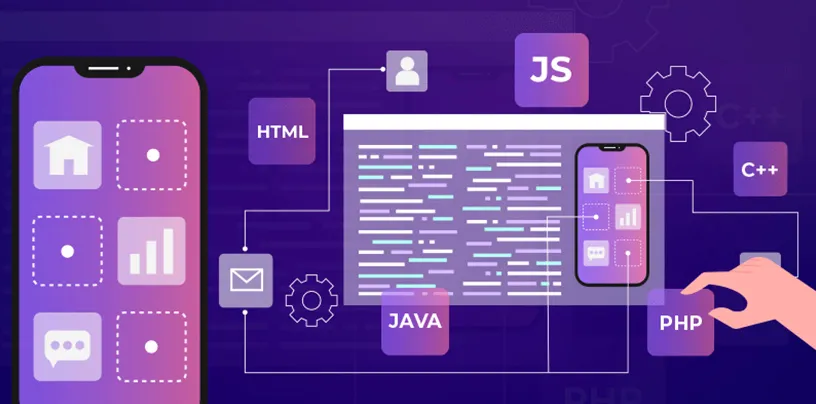
There are a number of excellent benefits that your business can get out of building a mobile application for its needs; whether that be for internal communication, marketing to new clients, or communicating with existing ones.
The objective that the mobile app you are building is meant to fulfill will have a major impact on the type of app you are developing; particularly with reference to its architecture.
In such a situation you have a choice.
You can either build a standalone native app that must be downloaded from an app store and take advantage of the features of a user’s device; or you can opt to build a simpler, more cost-effective and less resource-intensive progressive web app.
In this article, we will explore the differences, benefits and drawbacks of each of these.
This should give you a better idea of which framework would best meet the objectives of your business, no matter what reason you are developing an app for.
Native Apps
Native apps make use of a specific codebase and are developed to be compatible with certain devices that use that framework.
For instance, if a native app needs to be released for both Android and iOS systems, the app will need to be developed for each of those frameworks separately.
This allows the app to take advantage of the hardware and features of that specific device, and also enables it to stand alone as a functional application.
This gives them a number of unique advantages over web apps, but also means that they require specific skill sets to develop, and as such, generally come at a much higher cost than the other two.
Still, if you need to develop an app that is fast, highly functional and complicated, the native approach is generally the best bet thanks to the way they excel in terms of intuitiveness and functionality.
Benefits
From the above description, a few of the top benefits of native apps should start to show themselves.
Let’s take a look at some of the top advantages of choosing native development. These include superior performance, app store support, an enhanced user experience, the ability to use features on the device using the app, as well as higher levels of trust between potential users.
Best Performance
Out of the three approaches mentioned in this article, native apps provide some of the best levels of performance. These builds are generally more stable, reliable and efficient in the way that they use device resources.
This, in turn, creates a more pleasant experience for users but also provides the only viable option for particularly complicated or functional apps.
App Store Support & Discoverability
Because native apps are generally only downloaded from recognised app stores, they are also given more comprehensive support from platforms like the Google Play and iOS App Store.
On top of this, having a presence in these app stores also makes native mobile apps more discoverable than other types, which means that there is a much higher chance of users finding and using it, as opposed to other types that are not hosted on stores, and therefore may need additional marketing to get them into the hands of your potential users.
Smooth & Intuitive User Experience
Because native apps are built using compatible code for specific devices, they are built within a framework that accentuates best-practice guidelines for that specific device.
This means that navigation, usability and functionality all come with a sense of recognisability for users, who will find using the app an intuitive and natural experience without much of a learning curve.
By allowing for a framework that is familiar to your users, these types of apps make them more accessible to users, regardless of the devices they were developed for.
Make Use of Device Features
One of the top advantages to native mobile apps is that in being built with code that is compatible with specific devices, these types of apps are able to make use of the features and hardware on that specific device.
Consider the way Google Maps uses your location through GPS, how Apple Music can send you a notification when your favorite artist releases a new album, or how Instagram can make use of your phone’s camera and apply filters to it.
All of these are examples of how native apps use the functions of a device to provide a unique and seamless experience for users.
App Store Approval Raises Trust
As media consumers, we are all quite a picky lot. If we smell a rat, we are likely to keep our distance. Having native apps listed in the various app stores requires them to first be approved by the stores themselves.
This means that by simply being listed, there is an added layer of trust between the app and its potential users, which means a greater chance of users confidently downloading it.
Drawbacks of Native Apps
Of course, if native apps were just a list of benefits there would be no need for web-based ones. So, let’s have a look at a few of the disadvantages of building native apps.
Requires Experienced Developers
Because each platform that a native app is being developed for differs completely in their coding and frameworks, native apps need to be developed separately for each operating system it is released on.
This means that different developers will need to be used for each platform since each will specialise in a specific coding language.
Even when finding a developer that works across a few Operating Systems (such as Android and iOS), the app will still need to be built independently for each different OS, which can raise the price and time of development substantially.
Higher Cost of Development
Because of the reason mentioned above, and also because of the specialised skill set needed to develop native apps in various forms, these types of apps come at an extra cost to other types.
But when you consider their added functionality and superior performance, this extra cost is worthwhile for apps that need to take advantage of native development.
Not Ideal for Simple Apps
Because of the monetary and time costs of developing native apps, and because they work within a complicated framework of specific coding languages, they are not ideally used for simple apps with limited functionality.
While they can be used for more simplistic apps, the approach isn’t always practical, especially when web apps can facilitate them at less of a cost, and with less time in development.
Web Apps
Now let’s move to an approach on the opposite end of the spectrum, progressive web apps.
These types of apps take a much more general and simplistic approach to development, albeit one that offers far less functionality.
Still, cost-effectiveness and relative ease of development makes web apps ideal for simpler apps.
Web apps are generally used in browsers like Opera or Google Chrome. This is because they are developed using coding languages similarly used for websites like C++ and HTML.
Because of this, web apps only need to be built once. Since web architecture can be used seamlessly across multiple devices, it can be employed to be used on console, PC, Android and iOS all at once; as long as the device using it accesses the app through a browser.
In this way, the app itself is stored on a server rather than a device, from where it is accessed by users when they open the app through a browser. When changes occur on the web app, there is no need to push updates to users’ devices, since the changes will automatically be applied when they access the web app.
It does this, however, while sacrificing on the added functionality of native apps.
Benefits
The fact that they are somewhat simplified doesn’t make web apps worse than native ones. Just different. There are still a number of advantages that they can bring when used in specific situations:
Easy to Use Across Device Types
Because they are developed within a web framework, the same web app can be accessed, as is, across multiple devices, regardless of the operating systems they use.
This means two things: firstly, it means that the app only needs to be developed once, and secondly, it will be able to reach a wider perspective audience.
Less Costly to Develop
Because they are built for the web, these types of apps don’t require as specialized (and rare) a skill as native apps do.
They also only need to be developed for one platform that can be used across devices.
This results in remarkably lower development costs and times when compared to native apps.
No Need for Marketplace Approval
Since these apps behave similarly to websites, they are hosted in the same way as well.
This means that they don’t have to go through the sometimes-lengthy approval process that native mobile apps have to face. This is as true for hosting as it is for when the app needs to be updated.
Because of this, they can be made available to users in much less time than the other types of apps.
Easy to Update
When you update a native app, it needs to be done on the store. At that point, your users will be notified of the update and prompted to do it.
Progressive web apps on the other hand, only need to be updated on the host.
Since these apps are not necessarily downloaded to the device that is accessing it, updated features will show immediately when users access it.
This makes things a lot more convenient for your users, and also gives you more control over which build of the app they are using.
Drawbacks of Web-Based Apps
Limited Use of Device Features
Because web-based apps make use of a C++ framework, they do not contain any of the code that allows the app to take advantage of device-specific features. This means no camera, no GPS and no access to your contacts or storage.
Because of this, web-based apps are only really suited to very basic functions.
Difficult to Collect Usage Metrics
Collecting information on how many users are accessing your apps is straightforward enough with native apps since all of that information is readily available through the respective app store.
Since progressive web apps are hosted independently, that is, away from app stores, getting usage statistics that you can use to improve your services is a little more difficult, and not as detailed or accurate.
Poor Discoverability
Discoverability is also a concern when apps are not hosted on app stores. They will have to be marketed much in the way a website is if you want to attract in users.
This is perfectly fine and well if you are using an app to communicate with existing clients or offering them a service. But when you want your app to build its own success, native apps on stores are far more discoverable.
-END-
If you want to learn more about how low code can help you adopt a successful digital conversion strategy, you can contact BAYPM. However, if you are more interested in learning about the pros and cons of leading low code platforms, check out Gartner’s Magic Quadrant for Enterprise low code implementation platforms.
Resource: https://applord.co/building-mobile-apps-native-web/

